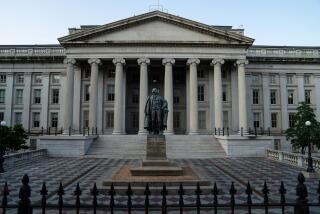Administration Sees Worst U.S. Budget Deficit in 1986 : Trims Estimate of Economic Growth for Year
- Share via
WASHINGTON — The Reagan Administration, acknowledging disappointing economic growth so far this year, today forecast that the country will suffer its worst budget deficit in history this fiscal year, $230.2 billion in red ink.
But the Administration, as it has in the past, predicted that the economy is on the verge of a substantial rebound in growth.
In its regular midyear review of the budget, the Administration predicted that economic growth for the full year will average 3.2%.
This forecast marks a downward revision from the Administration’s estimates at the beginning of the year that the gross national product would expand at a 4% rate this year.
Forced to Revise
Because of the slower growth, the Administration was forced to revise its estimate of the deficit for the 1986 fiscal year upward as well. The new $230.2-billion projection for the fiscal year, which ends Sept. 30, is 9% higher than last year’s record deficit of $212 billion.
This estimate means that Congress and the Reagan Administration are faced with reducing the deficit by $86 billion to reach the deficit-reduction target in the Gramm-Rudman law for 1987 of $144 billion.
That goal is critical because, under the Gramm-Rudman law, unless Congress and the Administration can agree on cuts to get within $10 billion of the projected deficit, across-the-board spending cuts affecting defense and many civilian government programs will go into effect.
Even the revised larger deficit projections are likely to miss the mark, since many economists believe that the Administration’s economic assumptions on which its budget forecasts are based are unrealistic.
4% Needed in 2nd Half
To reach the Administration’s new 3.2% growth forecast, the economy will have to expand in the second half of the year at a robust 4% annual rate.
That growth rate would be almost four times the pace of expansion in the April-June quarter, when growth slumped to 1.1%, the slowest performance since the end of the last recession in late 1982.
Many private economists are predicting economic growth for the rest of this year at just half the pace being forecast by the Administration.
But Beryl W. Sprinkel, the President’s chief economic adviser, denied that the Administration was issuing an economic forecast that had no chance of coming true.
‘Our Dead-Level Best’
“I don’t consider it rosy. I consider it realistic. We do our dead-level best to do an honest evaluation,” he said.
But Sprinkel conceded that unless the country’s huge trade deficit stops deteriorating, the economic assumptions will not come true.
More to Read
Get the L.A. Times Politics newsletter
Deeply reported insights into legislation, politics and policy from Sacramento, Washington and beyond. In your inbox twice per week.
You may occasionally receive promotional content from the Los Angeles Times.










